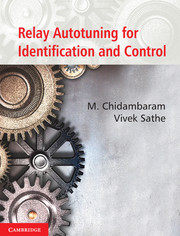Book contents
- Frontmatter
- Contents
- List of Figures
- List of Tables
- Acknowledgements
- Preface
- 1 Introduction
- 2 Improved Autotune Identification Methods
- 3 Cascade Controllers Tuning by Relay Autotune Method
- 4 Simultaneous Relay Autotuning of Cascade Controllers
- 5 A Simple Method of Tuning Cascade Controllers
- 6 Improved Saturation Relay Test for Systems with Large Dead Time
- 7 Identification of FOPTD Model using Single Symmetrical Relay Test
- 8 Autotuning of PID Controllers for Unstable FOPTD Systems
- 9 Autotuning of PID Controllers for Critically Damped SOPTD Systems
- 10 Estimation of SOPTD Transfer Function Model
- 11 Estimation of Five Parameters of Unstable SOPTD Model with a Zero
- 12 Identification of FOPTD Multivariable Systems
- 13 Identification of SOPTD Multivariable Systems
- 14 Tuning of Multivariable Controllers for Non-Minimum Phase Systems
- 15 Tuning of Multivariable Controllers by Genetic Algorithms
- 16 Summary and Conclusions
- Appendix A
- Appendix B
- Appendix C
- Nomenclature
- Problems
- Suggestive Reading
- References
- Index
Problems
Published online by Cambridge University Press: 05 June 2014
- Frontmatter
- Contents
- List of Figures
- List of Tables
- Acknowledgements
- Preface
- 1 Introduction
- 2 Improved Autotune Identification Methods
- 3 Cascade Controllers Tuning by Relay Autotune Method
- 4 Simultaneous Relay Autotuning of Cascade Controllers
- 5 A Simple Method of Tuning Cascade Controllers
- 6 Improved Saturation Relay Test for Systems with Large Dead Time
- 7 Identification of FOPTD Model using Single Symmetrical Relay Test
- 8 Autotuning of PID Controllers for Unstable FOPTD Systems
- 9 Autotuning of PID Controllers for Critically Damped SOPTD Systems
- 10 Estimation of SOPTD Transfer Function Model
- 11 Estimation of Five Parameters of Unstable SOPTD Model with a Zero
- 12 Identification of FOPTD Multivariable Systems
- 13 Identification of SOPTD Multivariable Systems
- 14 Tuning of Multivariable Controllers for Non-Minimum Phase Systems
- 15 Tuning of Multivariable Controllers by Genetic Algorithms
- 16 Summary and Conclusions
- Appendix A
- Appendix B
- Appendix C
- Nomenclature
- Problems
- Suggestive Reading
- References
- Index
Summary
Consider a system given by y(s)/u(s) = 2/(I + 1)3. With a proportional controller (withgain k = 2), get the response in y for a set point change of 0.1 of the closed loop system. Similarly, with each value of kc = 2.5, 3.0, 3.5 and 4, get the response for a step change in the set point. Can you get a sustained oscillation in the output when kc = 4? From the period of oscillation, and kc,max value, design a suitable PID controller using the Ziegler–Nichols tuning formulae. With the designed controller, obtain the response in the output for a step change in the set point.
For the system given in problem 1, replace the proportional gain by an on–off symmetric relay (h = + 1 and − 1 height). No change in the set point is considered. Check whether you can get a sustained oscillation in the output. Note down the period of oscillation. Using Eq.(1.8) calculate the controller ultimate gain. Hence, calculate the PID settings using the Ziegler–Nichols method based on continuous cycling oscillation method. With the designed controller, obtain the response in the output for a step change in the set point.
Consider the system y(s)/u(s) = 2 exp(−2s)/[(8s +1)(s +1)]. Using a symmetric relay with h = +1 and −1, obtain the oscillation in the output and identify the model parameters of FOPTD as given in section 2.2.
- Type
- Chapter
- Information
- Relay Autotuning for Identification and Control , pp. 243 - 246Publisher: Cambridge University PressPrint publication year: 2014



